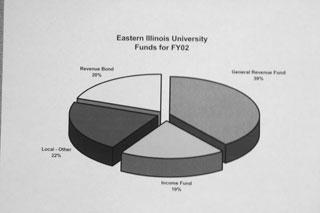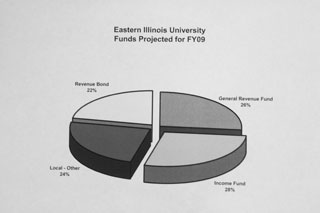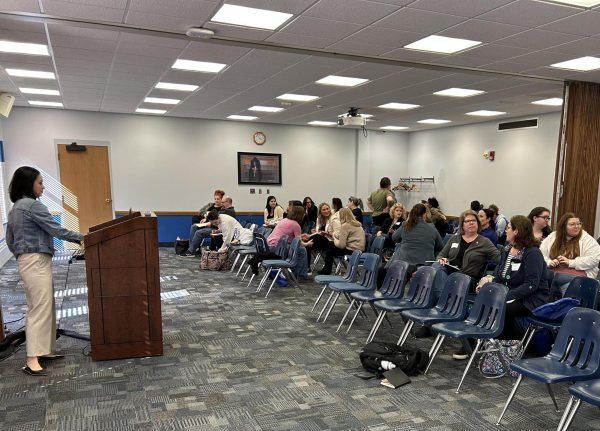Students Pick Up Tab
The July 1 deadline has come and gone without a new state budget being signed into law. After threats of cuts by Governor Rod Blagojevich and his recalling the General Assembly back into session, Eastern’s 2.8 percent increase in state allocations may not be a reality.
The 2.8 percent, as suggested by the General Assembly, would have equated to approximately $1,377,000, but Blagojevich’s proposed budget proposed a zero percent increase.
“They would be used to fund the president’s priorities of enhancing service and leadership opportunities for students; fine arts programming and outreach; student abroad opportunities; and the honors program,” said Jeff Cooley, vice president for Business Affairs.
The fiscal year 2009 proposed increase in appropriations would be just under the increase of $1,579,700 from the past two years combined.
While talking of an increase in appropriations instead of cuts is promising to university administrators, Eastern is still receiving approximately $5.6 million less than in fiscal year 2002.
“Because of the relative decline in state funding for the past several years, or only modest increases in the past couple of years, universities have increasingly had to turn to students to generate the revenue to sustain operations and maintain quality of academic programs,” said Don Severner, Illinois Board of Higher Education deputy director for External Relations.
Cooley is the first to say that costs for gasoline, electric and food for residence halls have climbed exponentially over the years to impact Eastern’s expenses. However, Cooley is following suite in recognizing that bad blood in Springfield may be causing some of the fiscal problems.
“I think politics do play a part in this,” Cooley said. “I think in order to address some of those shortfalls, higher education really took a hit and was looked upon to help fund some other areas in government. I think that’s evident when you look at appropriations.”
Blagojevich’s office did not return numerous phone calls and e-mails that requested comments on higher education funding.
Rep. Chapin Rose, R- Mahomet, has publicly accused Blagojevich of having poor communication and relationships with other state leaders. Rose also said it’s no coincidence that the large reductions to higher education funding occurred the very year Blagojevich took office.
Appropriations in fiscal year 2002 were $55,274,300 and dropped to $51,883,000 in fiscal year 2003.
“Usually the governor’s proposal is what happens in the end, it can deviate a little bit,” former governor Jim Edgar said. “With our last two governors, higher education has not been a high priority. When you have limited resources, as we do now, and your not a high priority, then you don’t do very well.”
Fiscal year 2008 was the first time ever that Eastern’s generated tuition income surpassed state appropriations. Illinois appropriated $49,189,200 to the university this year and tuition generated $49,494,000.
“I think one of the reasons it’s not a high priority to the governor or the former governor is politically, higher education doesn’t have the clout that elementary and secondary education does because of how many people are affected,” Edgar said. “You have the teachers union, the IEA, which is an extremely effective political force and you don’t really have that in higher education. Some of the community colleges are represented by the IEA.”
According to Blagojevich’s proposed budget, Eastern’s appropriations would remain the same as this year and student tuition would need to generate $57,281,000.
“Universities like Eastern, Western and some of the smaller state universities get a higher percent (of their budgets) from the state, but the percentage continues to go down because their costs continue to go up a lot higher than the state budget goes up,” Edgar said.
“That’s a trend that I doubt you’ll see a big turnaround,” Edgar said. “Maybe you can slow that trend down if you have a governor who put a higher priority on higher education, but I don’t think you’re going to see a turnaround and probably not even in the long term either.”
Steve Brown is the spokesperson for House Speaker Mike Madigan, and he said public universities abilities to raise tuition make them vulnerable.
“Sometimes what happens in regards to public universities is that legislators and state administrators know those schools have other sources of revenue and the (institutions) get pushed aside,” Brown said.
Brown agreed that competing programs are fighting for a limited amount of funding and that some organizations and institutions have more advocates that may be more influential than Eastern’s supporters.
“This administration and governor Blagojevich feel more strongly in advancing health care then anything else and I believe he’s one of those people who see that universities have elsewhere to get its money,” Brown said.
Edgar said part of the reason that there’s so much competition for funding is because of the state’s fiscal problems that started with former governor George Ryan and were not immediately attended to when Blagojevich took over.
“The problems right now with our budget and why there’s not money for low priority projects in the mind of the governor, like higher education, is that we never took care of our financial mess back in the early part of this decade and we just let it get worse and worse,” Edgar said. “If you think things are bad now, wait until next year.”
The budget crisis has resulted in much finger pointing, without many tangible solutions.
“There’s so much competition among the leadership,” said Roger Kratochvil, chairman of Eastern’s Board of Trustees. “I guess there’s always been competition, but I don’t remember it being as harsh as it is now, though. It’s really based down to three people- the head of the House, the head of the Senate and the governor and it’s a personal thing.”
Brown said there are legitimate concerns with communication lines, but he denied any personal grudges against Blagojevich.
While Kratochvil encouraged stronger lobbying, Edgar believes an outside entity would be needed to help students who are now paying the majority of the bills.
“Even if higher education all stood up and roared and said, ‘Governor, you’re mistreating us,’ I don’t know if they could change the process,” Edgar said. “It would take people from outside higher education to say, ‘Hey, this is important to use too.'”
“The area that I think is the natural ally of higher education should be the business community of this state, particularly some of our bigger corporations that use the University of Illinois, for example, to conduct a lot of research,” Edgar said.
Rose agreed with Edgar in saying community colleges are extremely valuable to their immediate communities because of varying labor pools.
“But a lot of smaller businesses use community colleges for job training so there’s a natural alliance there that I think would be beneficial for higher education to try to be given a little more priority,” Edgar said.
“I’m not real optimistic about it,” he said. “I think it’s going to take people outside higher education, like the business community to say ‘Hey, we can’t continue to ignore higher education because that has an impact on out economic vitality.'”
During Edgar’s last fiscal; year as governor, 1999, Eastern was appropriated $44,957,800 and student tuition was generating $23,609,100. His $3,087,400 increase from fiscal year 1998 to 1999 was more than any appropriations increase from Blagojevich.
Tuition revenue has climbed $18,659,700 from fiscal year 1999 to 2008, but state appropriations have only rose $4,231,400.
“In all fairness, things were going well in the state,” Edgar said. “The economy was going well and we had spending under control, so we had money, but I do think there’s a difference in priority from each governor and I don’t think it’s a high priority with this governor.”
Edgar was a 1968 graduate of Eastern.
“I probably put a higher priority on higher education, in part, because I came from a higher education environment,” Edgar said. “I grew up in Charleston, I was a state rep that had Eastern in (my district), I graduated from a state university.”
Rick Kambic can be reached at 581-7942 or at rwkambic@eiu.edu.






![[Thumbnail Edition] Eastern Illinois softball senior infielder Briana Gonzalez resetting in the batter's box after a pitch at Williams Field during Eastern’s first game against Southeast Missouri State as Eastern split the games as Eastern lost the first game 3-0 and won the second 8-5 on March 28.](https://www.dailyeasternnews.com/wp-content/uploads/2025/04/SBSEMO_11_O-1-e1743993806746-1200x692.jpg)






![[Thumbnail Edition] Junior right-handed Pitcher Lukas Touma catches at the game against Bradley University Tuesday](https://www.dailyeasternnews.com/wp-content/uploads/2025/03/MBSN_14_O-e1743293284377-1200x670.jpg)

![[Thumbnail Edition] Senior Foward Macy McGlone, getsw the ball and gets the point during the first half of the game aginst Western Illinois University,, Eastern Illinois University Lost to Western Illinois University Thursday March 6 20205, 78-75 EIU lost making it the end of their season](https://www.dailyeasternnews.com/wp-content/uploads/2025/03/WBB_OVC_03_O-1-e1743361637111-1200x614.jpg)







































![The Weeklings lead guitarist John Merjave [Left] and guitarist Bob Burger [Right] perform "I Am the Walrus" at The Weeklings Beatles Bash concert in the Dvorak Concert Hall on Saturday.](https://www.dailyeasternnews.com/wp-content/uploads/2025/03/WL_01_O-1200x900.jpg)
![The team listens as its captain Patience Cox [Number 25] lectures to them about what's appropriate to talk about through practice during "The Wolves" on Thursday, March 6, in the Black Box Theatre in the Doudna Fine Arts Center in Charleston, Ill.](https://www.dailyeasternnews.com/wp-content/uploads/2025/03/WolvesPre-12-1200x800.jpg)



















